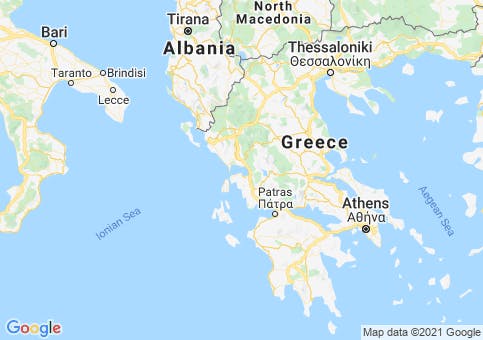By Lynn Roulo
Healthcare is one of the most important factors to consider when moving to a new country and the good news is that in Greece, you’ll have several healthcare options. In my eight years of living here, I’ve had a wide range of experience, visiting both public and private medical facilities, and I’m happy to report you can get high-quality medical care in Greece.
My Experience
For my first three years in Greece, I maintained an international healthcare plan through GeoBlue that would have allowed me to return to the United States for treatment should I have become seriously ill. During this time, I went to local Greek doctors for all of my needs and submitted claims when appropriate. After three years, I felt much more confident as I saw that Greece offers modern, quality healthcare with doctors who not only speak fluent English but often have been educated in the United States or the United Kingdom. I switched from the more expensive GeoBlue plan to Greek private health insurance at about half the cost. The Greek doctor I go to in Athens is Dr. Nikoleta Koini, a functional medicine doctor with an emphasis on proactive, preventative healthcare. This is to give you an idea of what healthcare in Greece can look like.
Let’s explore how it might work for you.
Get Your Free Greece Report Today!
Get Your Free Greece Report Today!
Learn more about a slower pace of life in Greece and other countries in our free daily postcard e-letter. Simply enter your email address below and we'll also send you a FREE REPORT — Retire in Greece—Find Your Dream Retirement in This European Archipelago.

By submitting your email address, you will receive a free subscription to IL Postcards, Overseas Dream Home, The Untourist Daily and special offers from International Living and our affiliates. You can unsubscribe at any time, and we encourage you to read more about our Privacy Policy.
Visa/Residency Health Insurance Requirements
Most visa/residency permits require you to show proof of health insurance. This can be easily accomplished with a simple, low-cost plan called “residence permit insurance.” This plan provides you the minimum coverage required for your visa/resident permit application and offers very basic coverage. My plan, for example, covered €10,000 ($12,000) a year for hospitalization, €1,500 euros ($1,800) a year for outpatient care, and €15,000 euros ($18,000) a year for personal accidents. I paid €150 euros ($180) per year for this coverage and submitted it with my resident permit renewal each renewal period.
If you don’t get private Greek health insurance, and you don’t qualify for public Greek health insurance, this plan can meet your visa/residency permit needs.
For more comprehensive coverage, there are two main options: public and private healthcare insurance, but first, let’s cover emergency healthcare.
Emergency Healthcare
For all residents, regardless of visa or residency status, if you have an emergency and need to go to a hospital, a Greek public hospital will provide your medical care for free. The situation doesn’t need to be life-threatening, but it does need to be roughly the equivalent of what would require an emergency room visit in the United States. For example, I developed an eye infection one summer that wasn’t life-threatening, but it did require a visit to a hospital. That hospital visit was free (a pleasant surprise!), and the prescription for treatment cost €4.
Public Healthcare Insurance
Greece offers socialized medicine, and the government operates a National Health System (ESY) that gives free or low-cost healthcare to all residents who qualify.
Who Qualifies for State-Provided Health Benefits?
Anyone, including expat residents and their families, who contributes to the Social Insurance Institute (IKA) through a social security system called AMKA qualifies for public healthcare insurance. Employment through a Greek company is the most common way to qualify for public healthcare. The other option is to pay into the system as a self-employed individual working in Greece. European Union (EU) nationals can also qualify for free healthcare benefits if they have a European Health Card which entitles the bearer to public health cover for a limited period of time. Retirees from EU countries who are receiving their pension from their home country, and who intend to settle in Greece, are also entitled to state health benefits.
If you are from a non-EU country and are not paying into the Greek social security system (e.g. you’ve come from the United States to retire in Greece, or you are a non-EU digital nomad living in Greece), you have two medical care options:
Pay out-of-pocket in public or private hospital/medical clinics. As outlined above, emergency care in public hospitals is available free of charge. You can pay out-of-pocket for all non-emergency care.
Obtain private medical insurance in Greece. This offers you medical coverage in the private hospital network offered by your private insurance plan.
Private Healthcare Insurance
Private healthcare insurance is available in Greece, and this is what many expats from non-EU countries opt into. There are two types of private medical insurance in Greece:
Medical coverage that gives you access to all hospitals in Greece (you must start this coverage before the age of 65. After you begin coverage, it continues regardless of your age).
Medical coverage that gives you access to all hospitals/clinics within the network you select (you must start this coverage before the age of 80. After you begin coverage, it continues regardless of your age).
There is a wide range of plans and coverage, and you can work with a broker to determine the best plan for you. While there are many options, a typical plan offers coverage of 80 to 85 percent of your medical treatment and services within the private healthcare network. There are many brokers who speak fluent English (for example, Stefania Tsouma at s.tsouma@beworth.gr) who can help you find a plan suitable for your situation.
Overall Cost of Healthcare
It is worth noting that overall, the cost of medical services including blood tests, X-rays, MRIs, etc. is generally lower than in the United States. A broker can provide you with a list of estimated costs based on your healthcare network and medical provider. Prescriptions are also generally less expensive than in the United States. As a general rule of thumb, you can expect to spend at least 50 percent less for your prescriptions. Premiums for Greek private health insurance are often less than what you would pay for similar coverage in the United States.
The Quality of Healthcare
The quality of healthcare in Greece is high but the difference in appearance can be broad. Private clinics and hospitals tend to be very modern, sterile, and professional looking. Public hospitals tend to be older, more run-down, and can feel a bit more chaotic on the inside. The first time I went to a public hospital I felt like I had stepped into a movie from the 1960s with paint peeling from the walls and a decidedly old feeling to the building. That said, the quality of care in both facilities is high, and the doctors are well-trained and often speak fluent English. Doctors often have shifts both in private clinics and in public hospitals so you might see the same doctor in both facilities.
The Fakelaki
If you live in Greece for a long period of time, you will eventually hear about the fakelaki. In Greece, there has been a longstanding, not-so-legal tradition of leaving an envelope (fakelaki) of money for a doctor for his services. This is something between a bribe and a thank you gesture. It is highly informal and varies from doctor to doctor. Some doctors will not accept extra money, some require it, and there is a huge spectrum in between. If you go through private insurance and are in a big city, the chance of being asked for an “additional payment” is much less likely. If you are at a public hospital in a remote village, the issue is more likely to come up. If this comes up, my advice is to involve your Greek friends as they can help you navigate the issue. In my eight years in Greece it has never come up for me, but I do know it exists.
Your Overall Health
As a final note, it is also worth mentioning that there is a good chance your overall health will improve with a move to Greece. The Mediterranean diet made up of fresh and unprocessed food drenched in olive oil is very healthy, as evidenced by the fact two of the five Blue Zone locations, regions where residents live the longest, are in Mediterranean countries (Ikaria, Greece and Sardinia, Italy). The Greek way of life, where afternoon siestas are common, also supports your health as the pace of life can be slower and less stressful than living in a big U.S. city. Personally, I watched my stress level decline, my focus on healthy eating and exercise increase, and there is something about the social nature of the country that leads to a feeling of wellness. I’ve been surprised to observe that Greece is good for my health. It might be good for yours too.
| Expense | U.S. | Greece Public | Greece Private |
|---|---|---|---|
| Doctor’s visit | $100 | Free or €10 | €60 – €150 (depending on specialization)* |
| Hip replacement | $40,000 | Free (a fakelaki fee might be asked…) | €4,000-€12,000* |
| Mammogram | $250 | Free or €5 ($6) | € 65 – €100)* |
*this is the total cost, the insured only pays a portion of this based on their specific coverage.
Featured image: ©iStock.com/MartinM303
Get Your Free Greece Report Today!
Get Your Free Greece Report Today!
Learn more about a slower pace of life in Greece and other countries in our free daily postcard e-letter. Simply enter your email address below and we'll also send you a FREE REPORT — Retire in Greece—Find Your Dream Retirement in This European Archipelago.

By submitting your email address, you will receive a free subscription to IL Postcards, Overseas Dream Home, The Untourist Daily and special offers from International Living and our affiliates. You can unsubscribe at any time, and we encourage you to read more about our Privacy Policy.







